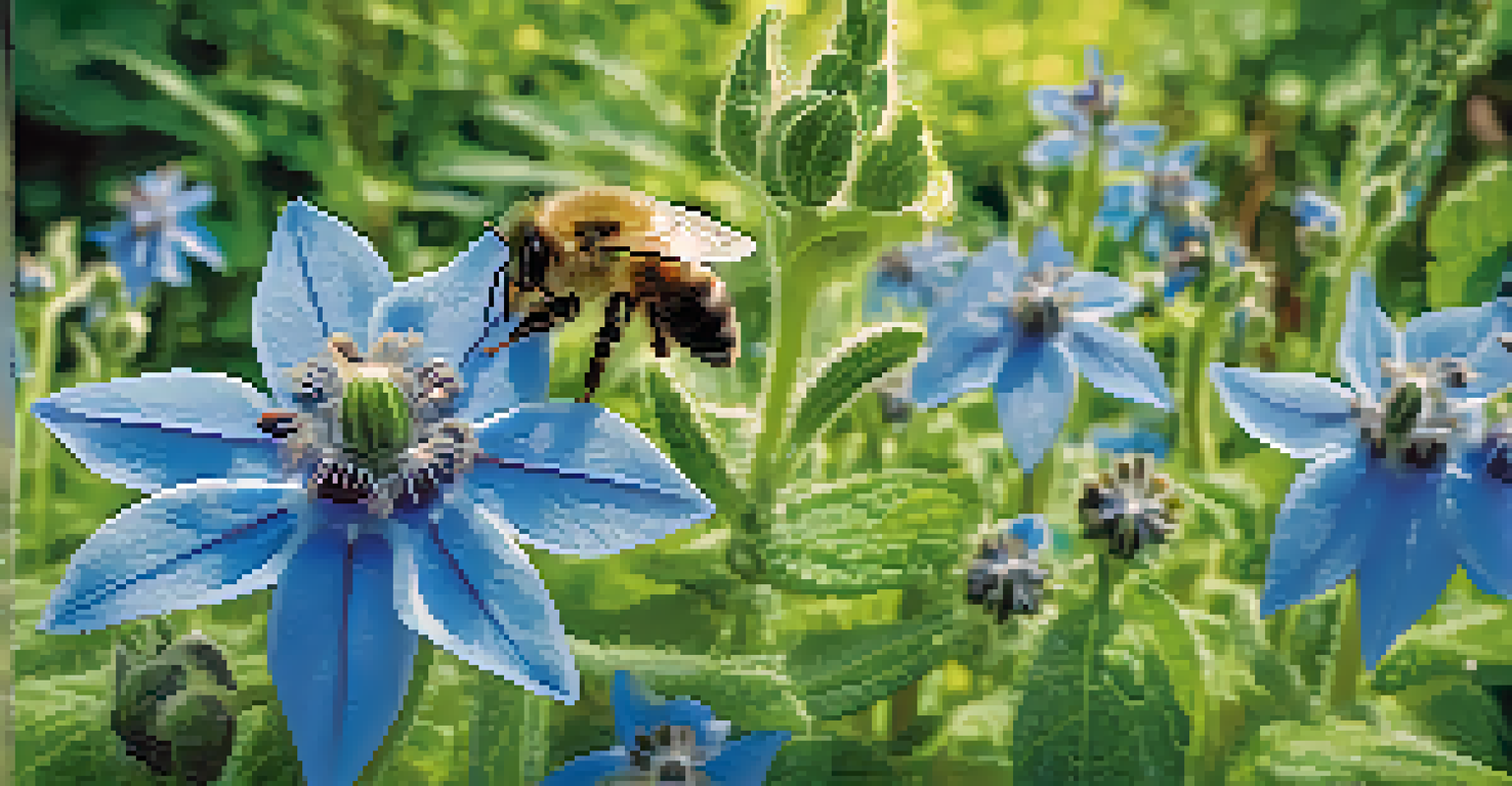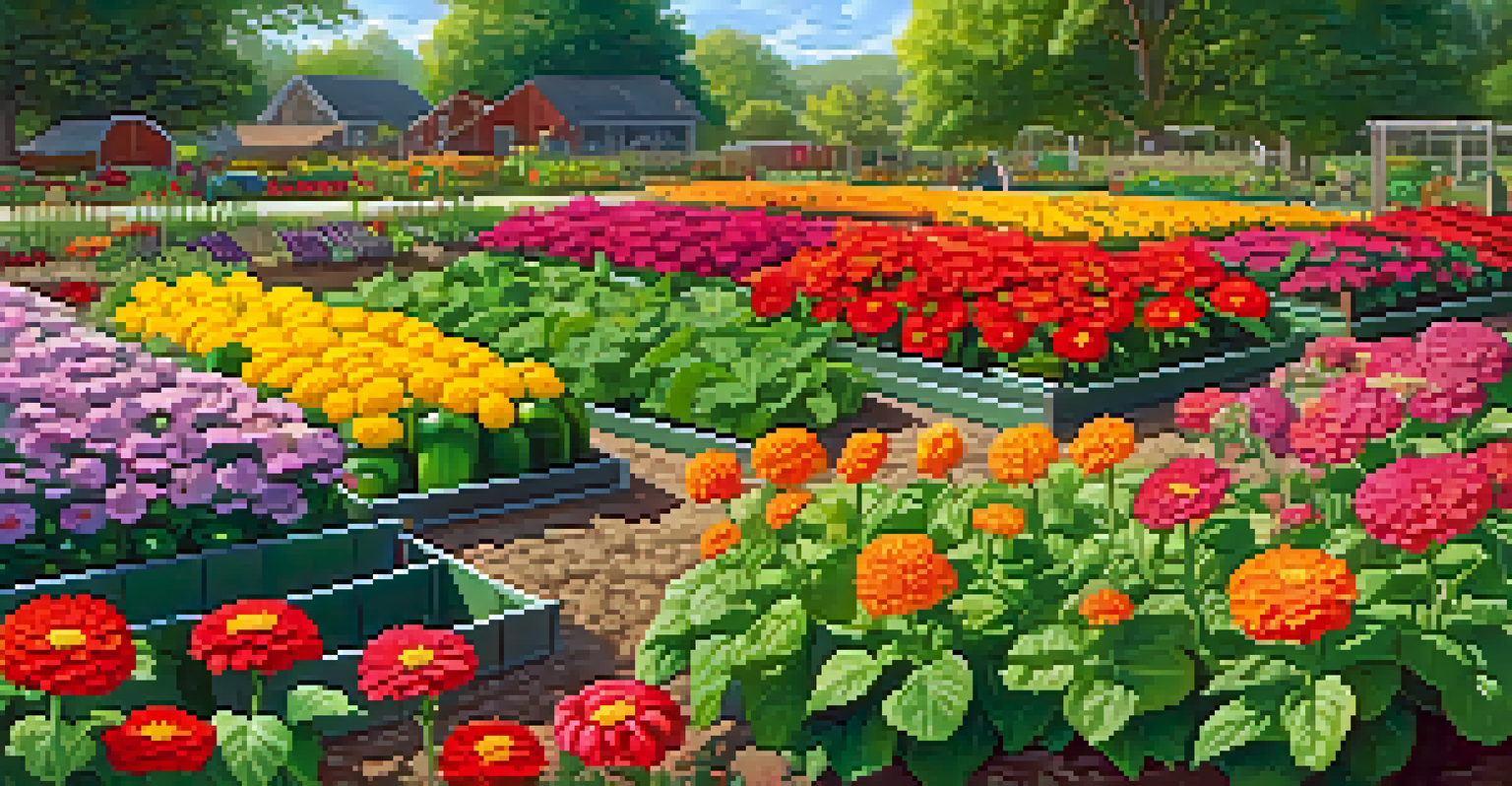Flower Power: Which Flowers Benefit Vegetable Growth

The Connection Between Flowers and Vegetables
Flowers and vegetables may seem like an odd couple, but they have a lot in common. Both thrive in gardens, and when planted together, flowers can create a symbiotic relationship that benefits vegetable growth. This partnership often leads to healthier plants and increased yields, making it a win-win for gardeners.
To plant a garden is to believe in tomorrow.
The essence of this relationship lies in the way flowers attract beneficial insects, such as pollinators and predatory bugs. These insects not only help in pollinating your vegetable plants but also keep pest populations in check. This natural balance reduces the need for chemical pesticides, fostering a more organic gardening approach.
Moreover, many flowers are known for their ability to improve soil health. By enhancing soil structure and nutrient availability, these flowering companions can create a more fertile environment for your vegetables. So, adding flowers to your garden isn't just about aesthetics; it’s about creating a thriving ecosystem.
Marigolds: Nature's Pest Control
Marigolds are often hailed as one of the best companion plants for vegetable gardens. Their vibrant blooms not only add a splash of color but also emit a scent that repels harmful pests like nematodes and aphids. This natural deterrent can significantly reduce the need for chemical interventions.

In addition to pest control, marigolds attract beneficial insects such as ladybugs and lacewings, which prey on common garden pests. This means that marigolds not only protect your veggies but also support a healthier overall ecosystem in your garden. It's like having your own tiny army of defenders!
Flowers Boost Vegetable Growth
Planting flowers alongside vegetables fosters beneficial relationships that enhance growth, attract pollinators, and improve soil health.
Planting marigolds alongside tomatoes, peppers, and other vegetables can lead to improved yields. As these flowers help manage pest populations, your vegetables can focus their energy on growing bigger and tastier. It's a beautiful cycle of growth and protection.
Nasturtiums: Edible Flowers with Benefits
Nasturtiums are not only stunning with their bright, cheerful colors, but they also offer a range of benefits for vegetable gardens. These edible flowers can act as a trap crop, luring pests away from your more prized vegetables. This allows your tomatoes and cucumbers to thrive without the threat of aphids and cabbage worms.
Flowers are the music of the ground. From earth’s lips they speak.
Moreover, nasturtiums have a peppery flavor that can enhance your salads, making them a delightful addition to your culinary adventures. Their ability to attract pollinators also helps boost the overall health of your vegetable crops. When bees are buzzing around, you know your garden is in good shape.
Lastly, nasturtiums are easy to grow and can thrive in various soil types. Their vibrant blooms not only beautify your garden but also provide a practical solution for pest management. It's gardening at its finest—functional and fabulous!
Borage: The Bee's Best Friend
Borage is a lesser-known flower that packs a powerful punch in the vegetable garden. Known for its striking blue star-shaped flowers, borage is a magnet for pollinators, especially bees. This can significantly enhance the pollination of nearby vegetable plants, leading to more robust fruit and vegetable production.
In addition to attracting pollinators, borage has deep roots that help improve soil structure. As these roots grow, they bring nutrients from deeper layers of soil closer to the surface, making them available to your vegetable plants. It’s like giving your veggies a nutrient-rich boost without any extra effort.
Marigolds Control Garden Pests
Marigolds serve as natural pest deterrents while attracting helpful insects, making them an essential companion plant for vegetable gardens.
Finally, the leaves of borage are edible and can be used in salads or as a garnish. By incorporating borage into your garden, you're not only improving vegetable growth but also diversifying your culinary options. This plant truly embodies the spirit of flower power!
Sunflowers: Tall Guardians of the Garden
Sunflowers are not just a cheerful sight in the garden; they also play a significant role in promoting vegetable growth. Their tall stature can provide shade for more delicate plants, protecting them from the harsh midday sun. This is particularly beneficial for leafy greens, which can wilt under intense heat.
Furthermore, sunflowers attract a variety of beneficial insects, including pollinators and predatory beetles. These insects help control pests that might otherwise damage your vegetable crops. Just imagine a sunflower standing tall like a protective guardian over your garden—what a lovely image!
Finally, sunflowers can also help improve soil health. As they grow, they can draw up nutrients from deep within the soil, which can then be returned to the earth when the plant decomposes. So, not only do they beautify your garden, but they also contribute to a more sustainable gardening practice.
Calendula: The Pot Marigold's Magic
Calendula, commonly known as pot marigold, is another flower that can greatly benefit your vegetable garden. Its bright orange and yellow blooms are not just visually appealing; they also have properties that deter pests like aphids and whiteflies. This can help safeguard your vegetables from unwanted invaders.
In addition to pest resistance, calendula attracts beneficial insects such as hoverflies, which feed on aphids. This creates a natural balance in your garden, where helpful insects thrive while pests are kept at bay. It’s a harmonious ecosystem that every gardener dreams of.
Choose Flowers for Your Garden Wisely
Selecting the right flowers based on climate and companion planting principles can lead to a thriving and productive vegetable garden.
Moreover, calendula has a long blooming season, providing continuous beauty and protection throughout the growing period. By planting these flowers, you're not only enhancing the visual aspect of your garden but also fostering a thriving environment for your vegetables to flourish.
Zinnias: Colorful Companions for Veggies
Zinnias are a feast for the eyes, but they also offer practical benefits for vegetable gardens. These colorful flowers attract a variety of pollinators, including butterflies and bees, which can boost the pollination of nearby vegetable plants. Increased pollination often translates to better fruit set and yield.
Additionally, zinnias can help improve biodiversity in the garden. By attracting different species of insects, they create a more balanced ecosystem that can lead to healthier plants overall. This diversity is important for maintaining resilience against pests and diseases.

Finally, zinnias are incredibly easy to grow, thriving in sunny spots with minimal care. Their resilience makes them perfect companions for a variety of vegetables. By incorporating zinnias into your garden, you’re not just adding beauty; you’re enhancing the overall health of your vegetable patch.
Choosing the Right Flowers for Your Garden
When selecting flowers to plant alongside your vegetables, consider factors like climate, soil type, and the specific pests you want to deter. Some flowers thrive in certain conditions, while others may not. It’s crucial to match the flowers with your garden’s unique environment to ensure success.
Think about companion planting principles. Certain flowers work better with specific vegetables, so do a little research to find the best combinations. For example, planting marigolds near tomatoes can be highly beneficial, while nasturtiums thrive alongside cucumbers. This knowledge will empower you to make informed choices for your garden.
Lastly, don’t be afraid to experiment! Gardening is as much about trial and error as it is about knowledge. By observing how different flowers interact with your vegetable plants, you can discover what works best in your garden. Your garden will thank you for it, blooming beautifully and producing bountiful harvests.